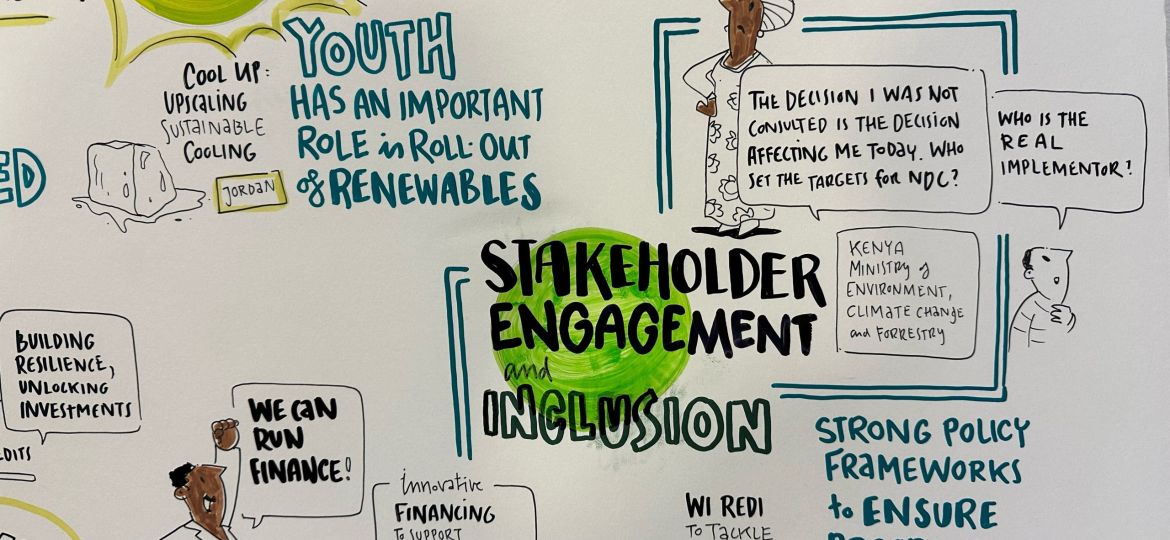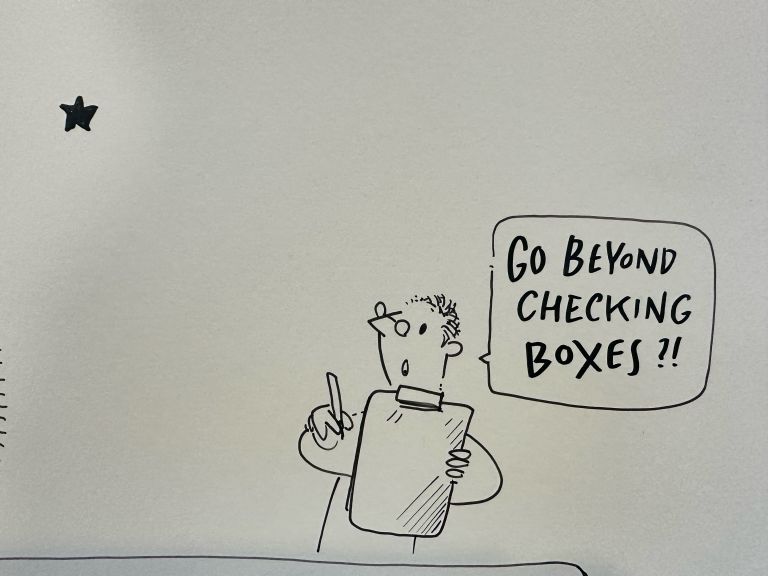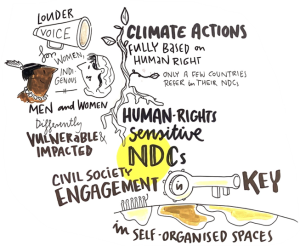
Why do we need gender-responsive, inclusive, and diverse conferences?
Conferences are supposed to be safe spaces for learning, networking, and professional development. The organisers of the Global NDC Conference 2023 were dedicated to providing an inclusive conference space in which everyone can participate regardless of gender, gender identity and expression, sexual orientation, physical ability, physical appearance, body size, race, age, religion, or any other social category. We were aware of the need to address intersectionality, meaning the discrimination of a person due to overlapping and simultaneous factors.
In the context of the Global NDC Conference 2023, we implemented a Gender-Responsive Event Management (GREM) approach based on the guidelines of the International Climate Initiative (IKI). The measures taken aimed not only for numerical gender parity but also enhanced awareness by all participants and an inclusive environment in which everyone feels comfortable to speak up, share thoughts, and voice opinions. No attendee should at any point feel uncomfortable due to harassment, discrimination, or exclusion.
What processes did we follow?

Collective brainstorming with all partners
Months ahead of the conference, organising partners had an in-person workshop to develop different action items related to gender and diversity across areas and phases of the planning process.
Appointing a Gender and Diversity Task Team
A core team of three people were tasked to track, develop and discuss gender and diversity measures.
Setting a Gender and Diversity Action Plan
The Gender and Diversity Team assessed and translated identified action items into a Gender and Diversity Action Plan, enabling the possibility to set goals and monitor progress.
Drafting a Code of Conduct
The gender-inclusive Code of Conduct helped to create an environment that is welcoming and respectful to all attendees, regardless of their gender or other personal characteristics. It applied to all participants.
Follow up
Discussions at weekly meetings among organisers took place, reviewing the implementation of measures.
The measures we implemented
- Integrate gender and diversity issues into the conference agenda.
- Involve gender experts.
- Address gender and diversity issues in an integrated manner (mainstreaming).
- Work in smaller break-out sessions to create a more inclusive and participatory setting.
- Strive for gender balance and geographical diversity in all sessions and roles.
- Integrate women, youth, indigenous people meaningfully in panels and discussions.
- Advise session leads on how to integrate diverse perspectives and inform on inclusive language.
- Encourage women and non-conforming gender identities to attend.
- Include different options for the indication of gender identities (m/f/d/NA).
- Address important issues in the Frequently Asked Questions (FAQs).
- Provide the option to indicate pronouns and to display them on badges.
- Establish and enforce a Code of Conduct.
- Nominate an Awareness Team and create a Box of Concerns.
- Provide free sanitary products.
- Provide information on childcare services.
- Reserve a room for nursing needs.
- Use gender- and diversity-sensitive, non-discriminatory language.
- Avoid gender bias and stereotyping (in the design of communication material).
- Include questions on gender and diversity issues in surveys / feedback forms with participants and partners.
Highlights
Regional representation
The conference brought together nearly 350 experts from over 50 countries. More than 50% of the overall participants came from North America and Europe. This can be partially explained by the high participation of Germany-based organisations for whom attendance was easier.
When it comes to representation, we made sure that regions were adequately represented, providing the possibility to voice diverse concerns.
More than 50% of the overall participants as well as panel speakers and moderators were female, displaying a strong overall representation of women at the conference.
Learnings and feedback from participants


Diversity as a success factor
Participants highlighted that the diversity of attendees enabled a productive and positive atmosphere, as well as “a wide range of best practices”.
Sectoral diversity
The 350 experts who participated at the conference are working as government officials, in private and financial sectors, as researchers, in civil society, and as representatives from local, indigenous, and youth groups. Participants noted an increase in financial sector participation but recommended more NGOs for next time.
A safe space to speak up
According to your post-event survey, most participants felt comfortable sharing their thoughts and voicing their opinions during the conference, regardless of their position, origin, and other social categories.
Code of Conduct & Awareness Team
Even though no request was brought forward, participants voiced their appreciation of the Code of Conduct, Awareness Team and Virtual Box of Concerns. These measures were considered as “good”, “wise”, “useful”, and “essential.”


